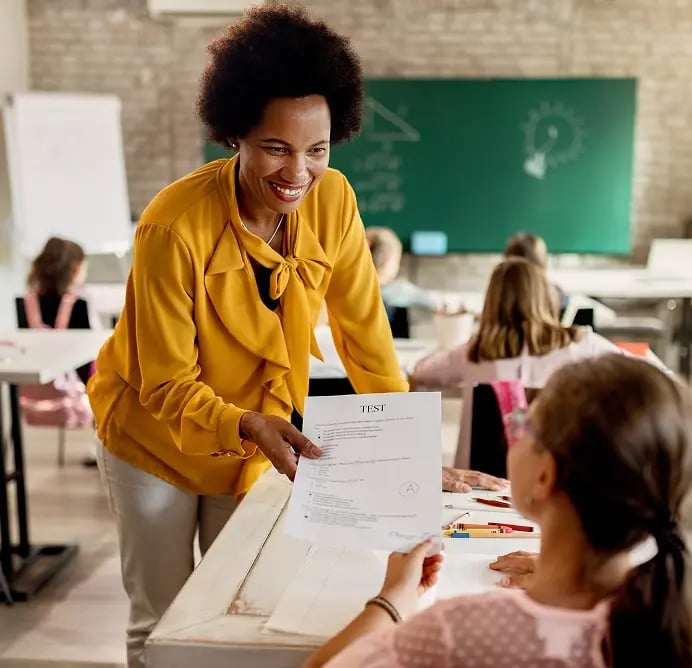One of my mistakes as a new instructional coach was applying my understanding of student learning directly to the adult professional development sessions I led. My goal was to model instructional practices and strategies that worked with students. However, my super fun, get-out-of-the-seat learning games were not as engaging or appropriate for adult learners. I quickly realized that training for my peers would look vastly different from that of a classroom full of 8th graders.
MTSS Professional Learning: Key Takeaways
- It is essential to use the professional development time intentionally and differentiate according to the needs of these adult learners.
- With MTSS implementation, it is essential as the leader to ask important and “real” questions about your school's work.
- A primary principle of adult learning theory is that adults need to know why they are learning.
- Providing choice in topics and content of learning can allow each person to pursue the professional development they feel they need.
What I failed to understand was that adult learners need a different approach. There are certainly applicable teaching concepts and ideas from the classroom, but it is necessary to consider ADULT learning theory when planning professional development and learning opportunities for adults.
Professional development leaders encounter a vast range of staff expertise and experience around different topics, so it is essential to use the professional development time intentionally and differentiate according to the needs of these adult learners. Planning with intention demonstrates respect for the educators' time and experience, and it will help establish short and long-term goals for learning.
Creating an MTSS system is no small feat and requires a commitment to professional learning and support for all staff members. It’s essential that after spending so much time each year in professional development, teachers feel they can indeed apply their new knowledge and implement professional learning for MTSS to ultimately change outcomes for students.
Freeman, 2022
Principles That Impact Adult Learning
When leading professional development, it is essential to consider how adults learn best. Malcolm Knowles developed Adult Learning Theory in the 1970s. Knowles explored the idea that adult learners need and want applicable knowledge. (Ponder, 2023) The idea is that pedagogy applies to children, whereas andragogy applies to adult learning.
Andragogy is defined as the art and science of teaching adults. According to Instructional Design.org, andragogy assumes that adults need the following:
- why they are learning something,
- to learn experientially,
- approach learning as problem-solving,
- and the topics need immediate value.
Here are a few principles to consider when planning professional development sessions:
Assess the Need
Use a variety of methods to determine what professional development is actually needed. This will include observation, data collection, and analysis, but also remember to ask staff directly what they need and how they would like to engage in their learning. Staff are often very aware of the learning needs of themselves and their departments.
For example, in a team meeting, a teacher might bring up a need for training or further understanding concerning supporting students who struggle with behavior. Take note of the need to see if more staff need the same training.
With MTSS implementation, it is essential as the leader to ask important and “real” questions about your school's work. Some teachers may tune out of professional development if they already know the information or if underlying issues are ignored.
Here are some questions to consider regarding MTSS:
|
Question |
Possible Evidence |
|
Is the core curriculum supporting a minimum of 80% of all students (i.e., are 80% of students on grade level)? |
|
|
Does the core curriculum support students across demographics, schools, grades, and classrooms? |
Curriculum-embedded assessment and nationally normed assessment data broken down by various categories |
|
Are students progressing, and do we see healthy tier movement?
|
Students are moving out of tiers, as evidenced by universal screeners or progress monitoring tools. |
|
Are students progressing objectively?
|
Review the data above and filter it by race, gender, ethnicity, etc. |
|
Are evidence-based interventions delivered with fidelity? |
Progress monitoring data for the research-based interventions in use. |
|
Are efficiencies being found by creating small groups for like needs? |
Information identifying which interventions have been selected for students
|
Start With the Why
A primary principle of adult learning theory is that adults need to know why they are learning. No teacher wants to sit through professional development that is irrelevant to them. The “why” should be directly connected to the work.
This dedicated time is sacred for educators needing to step away from the flurry of plans, decisions, and discussions that define their daily work. Professional learning allows us to reflect, learn, and grow with the ultimate goal of helping students, families, and communities achieve and live the most positive school experience.
Schutz, 2022
Given the complexity of MTSS, it is necessary to develop the learning experiences for teachers explicitly and sequentially. Reviewing the purpose and relevance to learners at the lesson's start will help motivate them to master the content. But as Karen Castle, Executive Director of Professional Learning at Branching Minds, says, “Along with the why, we have to know the what and how.” It is not enough to say, “We are learning this to help our students,” but expand on that and directly share how this learning will impact their work.
Here are a few examples:
- Learning about a new behavior intervention: “This training will help you feel more prepared to deal with situations in your classroom so that you can continue to have strong relationships with your students.”
- Training around a new meeting structure: “We are having everyone learn about these meeting procedures so that our meeting time is as efficient and productive as possible.”
Offer Choice in Modes of Learning
Offering choice in learning is also essential for adults. One of the best things my school leaders discovered from remote teaching and learning was the benefits of a self-paced in-service day. We had necessary asynchronous training to complete, but for the rest of the time, we could choose from a list of other professional development, some designed by our peers. After watching videos or completing activities, we completed a reflection. The best part was that they gave us a week to complete these activities, allowing time for those who took a deeper look.
Adults appreciate when they have options in their learning, whether working at their own pace, asynchronously or even learning along with their peers. It may depend on the learning topic, but here are some considerations about providing options.
- Self-paced: Make a plan for how staff can work through learning at their own pace so that they can choose to go deeper into learning and not feel rushed. This might look like kicking off a professional learning day with some instructions but allowing everyone to individually complete parts of the learning independently or with a group. There are ways to still have a level of accountability, like submitting a reflection or the next steps for their learning. Accountability does not have to feel like checking off a box or a heavy lift for teachers.
- Asynchronous: Giving a time frame for learners to complete the training so they can learn when it works for them. This is would applicable for mandatory training or to provide foundational learning or review on certain content for everyone.
- Professional Learning Community (PLC): Learning alongside peers, whether it be departmental or grade level, increases engagement and contributes to the culture of the school. “PLCs allow teachers an easy way to share best practices and brainstorm innovative ways to improve learning and drive student achievement.” (Serviss 2022)
A note about choices for learning: This is a big one. Every staff member is comprised of educators and support staff at different levels and with different levels of experience in their roles. Not only that, there are usually many different kinds of content or roles within one staff: counselors, paraeducators, math, science, interventionists, etc. Providing choice in topics and content of learning can allow each person to go after the professional development they feel they need. This is empowering for educators.
Tap Into the Experience of Staff
Utilize the experience and knowledge that you have within your staff. Learning from peers is a great way to engage educators. Veteran teachers do not always have to be the leaders; tap into newer teachers with valuable perspectives and energy that can inspire their more experienced colleagues. This can also include teachers observing each other.
Allowing teachers to observe each other and debrief together can help them learn from each other in highly contextualized ways that are immediately applicable to their practice.
Henderson, 2021
Another way to tap into staff is to utilize the flipped learning approach, with the team learning about a topic independently and returning to the group for discussion and collaboration. Discussion is where deeper learning and application can occur as the staff reflect together and apply to learning in their own context.
Keep the Learner in Mind
Effective professional development begins with a deep understanding of the participants and how to create an experience that ensures that learning and application actually happen. MTSS thrives when the adults are committed to continually learning and growing to support the students within their schools. MTSS requires educators to work much more collaboratively to help all students, which can often be challenging at first given the intricacies of school-based scheduling and the different potential levels of understanding of what MTSS means in daily practice.
What is essential to quality professional learning, specifically for an MTSS implementation, is a thoughtful plan that considers the intricacies, level setting the understanding of MTSS, and the school’s annual goals.
Schutz, 2022
Professional Learning Resources
- Learn more about our MTSS Professional Learning Series
- Read more about planning MTSS professional development
- Listen to: Episode 16 of our podcast about Questions Leaders Should be Asking About MTSS
👉 Additional Resource: The MTSS Coaching Toolkit
Citations/Resources:
Freeman, Lindsay. 2022. “4 Considerations to Support Educators in MTSS Professional Development.” Branching Minds. https://www.branchingminds.com/blog/4-considerations-for-supporting-educators-in-mtss-professional-development.
Henderson, Katya. 2021. “Benefits of and Strategies for Teacher Collaboration in MTSS.” Branching Minds. https://www.branchingminds.com/blog/teacher-collaboration-mtss.
Ponder, Nixon -. 2023. “The Andragogy Approach: Knowles’ Adult Learning Theory Principles.” Research.com. https://research.com/education/the-andragogy-approach.
Schutz, Lauren. 2022. “How to Plan MTSS Professional Learning Throughout the Year.” Branching Minds. https://www.branchingminds.com/blog/how-to-plan-mtss-professional-learning-throughout-the-year.
Serviss, Jennifer. 2022. “ISTE – 4 Benefits of an Active Professional Learning Community.” ISTE. https://www.iste.org/explore/professional-development/4-benefits-action-professional-learning-community.

About the author
Larissa Napolitan
Larissa Napolitan is the Content Marketing Manager at Branching Minds and host of the Schoolin’ Around podcast, where she spotlights innovative voices and practices shaping education today. A former middle school teacher and instructional coach, Larissa draws on her classroom experience to create meaningful content that connects research, storytelling, and practical insights for school and district leaders. She is passionate about amplifying educator voices and supporting the growth of all students.

MTSS Professional Learning
Deepen educator practice and strengthen your infrastructure to sustain MTSS through onsite and remote professional development options.












.png?width=1436&height=956&name=Utilizing%20Adult%20Learning%20Theory%20in%20MTSS%20Professional%20Development%20(1).png)


.png?width=716&height=522&name=5%20Tips%20for%20De-Escalation%20and%20Building%20Strong%20Relationships%20with%20Students(preview).png)
